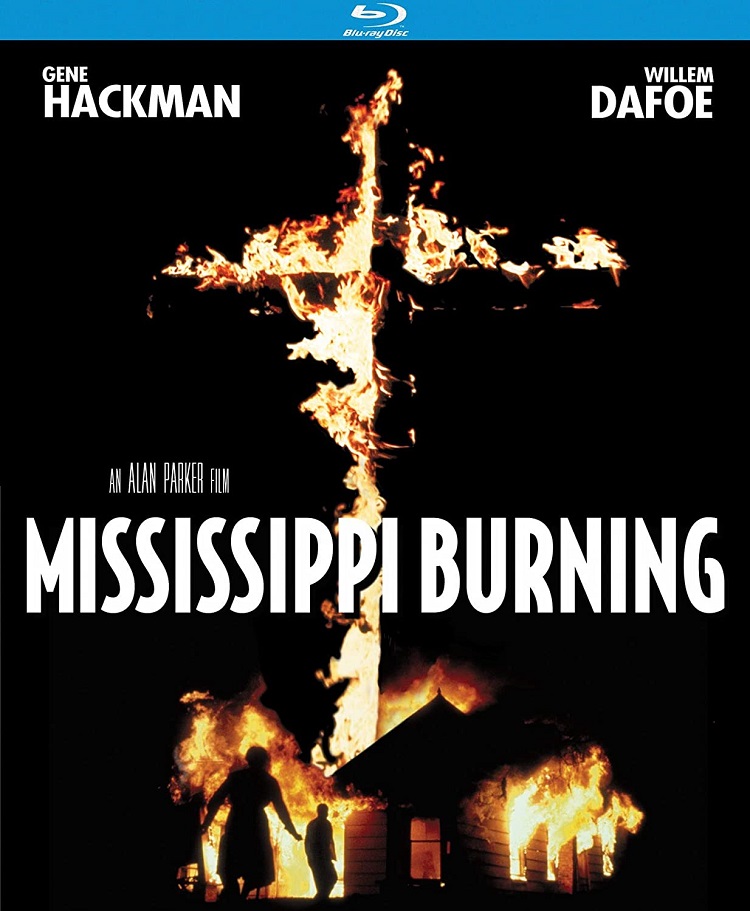
I gotta tell you, dear reader, that I wasn’t real excited sitting down to watch this new Kino Lorber Blu-ray release of Mississippi Burning. I can’t remember the first time I watched it, must have been a few years after it came out in 1988 for I can’t see 12-year-old me being interested in it. Whenever it was, I quite liked it. Enough so that I bought it on VHS sometime in the mid-’90s. But I haven’t watched it in at least a decade and I was afraid it wasn’t going to hold up. I was worried that it would be another well meaning Hollywood film from the 1980s that attempted to shine a light on race relations in America that ultimately wound up with a gleaming white-savior motif with nary a black character that wasn’t used as a prop, a signal, or a means to its progressive, anti-racist world view. How many well meaning anti-racist message films wind up showing that what minorities really need is a really nice white dude to protect them?
Mississippi Burning doesn’t completely get out from behind this problem. It is ultimately about two white guys (liberal Yankees at that) who swoop down into the Deep South in the mid-’60s to solve the disappearance of some Civil Rights workers and solve racism. But it has a good script, some fine directing by Alan Parker, and powerhouse performances from its inspiringly great cast.
Loosely based on The Freedom Summer murders, the film opens with three civil rights workers (two white men, one black) leaving the small Mississippi town where they helped the African American community register to vote and visited a small black church that had been burnt to the ground by the KKK. They are pulled over by three cars, one of which is a police vehicle, and are then shot in the head. At first considered a missing-persons case, two FBI agents are assigned to find them. There is Alan Ward (Willem Dafoe), a straight-laced, by-the-book agent who is leading the case and Rupert Anderson (Gene Hackman), a good old boy who used to be the sheriff of a small southern town who is willing to bend a few rules in order to get results.
Like the boring square in a ’60s counterculture flick, Ward is completely out of place. He walks up to a black man in a segregated cafe and asks him questions in full view of the onlooking white folks . He wanders into the black section of town with his notebook expecting to get answers. What he gets is blank stares for everybody knows if they cooperate with the Feds, they’ll only get lynched for their trouble. For the FBI will eventually leave, but the Klan is there to stay. Anderson takes a more laid-back approach. He hangs around at the barbers listening to the scuttlebutt. He talks to the ladies at the beauty salon and discusses the local flowers with the black minister. He’s also not afraid to give a beat down when he feels it’s deserved or threaten the scrotums of Klansmen who don’t give him the answers he needs. But Ward is the boss so Anderson has to curtail his methods until they get desperate. But first Ward will bring in hundreds of agents who will scour the town looking for answers. But the Klan know how to keep secrets and everyone else is too scared to talk. Eventually, they do get answers, but only after Anderson does things his way.
The script at times beats you over the head with its themes. Following the book like Ward won’t get you anywhere, it says. Sometimes you have to get dirty to get results. Educated Yankees don’t know how to deal with the racist South, only good old boys do. But either way, it is still white dudes coming to save the day. Most of the main cast are white. The screen is filled with African American characters but few of them get speaking roles and none of them are developed in any meaningful way.
Parker packs a wallop with his images. You really feel the film’s title as he shows numerous churches and houses and crosses set ablaze by men in white sheets. There are beatings and lynchings.
The violence is visceral, pounding you in the gut like a full fist. There is also the extreme poverty. The houses, even of the white people, but especially of the black community, are run down, broken, and dirty. Parker lets his camera linger just a moment more then is necessary over the places and people showing just how poor everybody is. It is as if to say that poverty breeds anger, and anger leads to hatred. It is difficult to watch these images and not ruminate on how far we’ve come and yet how much more work there is to do.
Dafoe and Hackman are terrific. Dafoe is mostly subdued and righteous while Hackman is full of wild fury. The secondary cast is great too. There’s Michael Rooker as a Klansman and R. Lee Ermey as the ineffectual mayor who turns a blind eye to the racist violence in his town. Brad Douriff plays the Deputy Sheriff who leads the Klan and was there the night of the murders. And Frances McDormand is magnificent as the Deputy’s wife who hates what’s happening but doesn’t know how to leave.
I came back to Mississippi Burning expecting my fondness for it to be spoiled by my own maturity and deeper understanding of the film’s themes. I half figured I’d come out disappointed by a well-meaning film that butchered its own intentions. But while the film certainly has its problems, it remains a powerful film filled with really wonderful performances from its stacked cast.
Kino Lorber presents Mississippi Burning with a 1.85:1 aspect ratio and a 1080p transfer. Extras include an informative commentary by Alan Parker and a theatrical trailer.